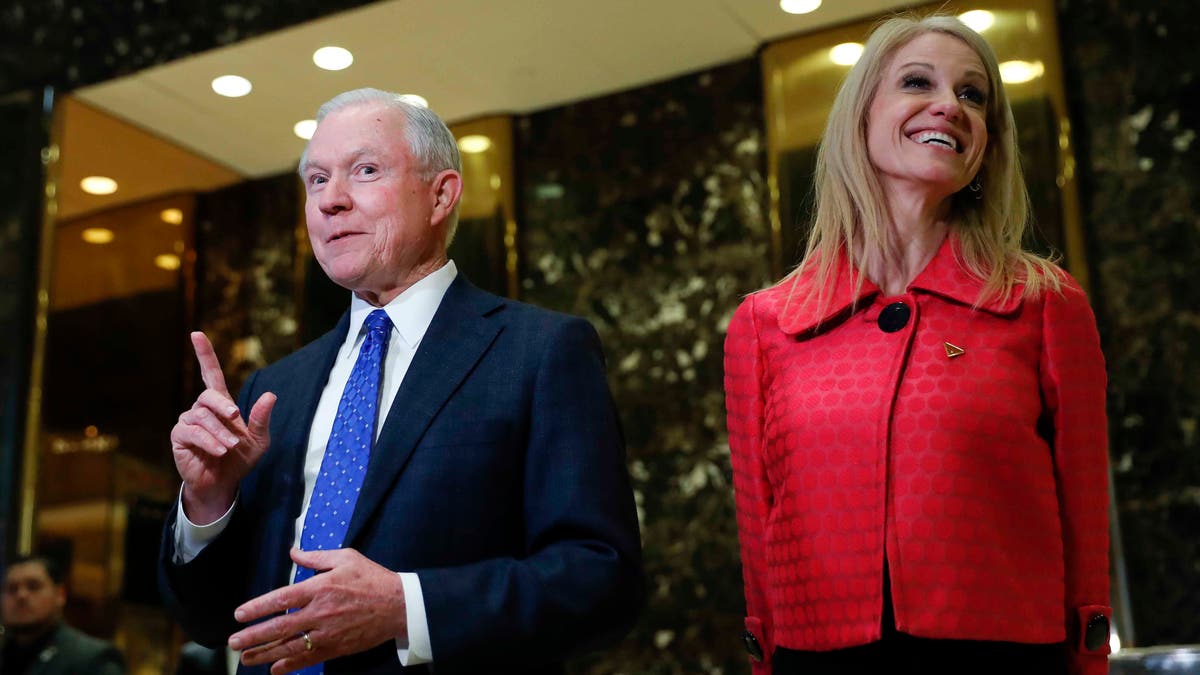
Sen. Jeff Sessions and Trump campaign manager Kellyanne Conway on Nov. 17, 2016. (Copyright 2016 The Associated Press. All rights reserved.)
President-elect Donald Trump filled key posts in his administration Friday morning, including Alabama Sen. Jeff Sessions for the job of attorney general.
He also named Kansas Rep. Mike Pompeo to head the CIA and former military intelligence chief Michael Flynn as his national security adviser. All three are fierce critics of President Barack Obama's handling of terrorism and international relations.
Sessions was the first member of the U.S. Senate to endorse Trump, rallying behind the Republican's hardline immigration policies.
On Friday, Trump called Sessions "a world-class legal mind."
Sessions has tangled with the past two Democratic attorneys general on whether terrorism suspects should have American constitutional rights in civilian court and on the planned closure of the Guantanamo Bay detention facility. He's also been protective of the attorney general's right to refuse a legally unsound directive from the president.
Sen. Ted Cruz said Sessions’ nomination is “great news” for all the people who revere the Constitution and the rule of law.
“Sen. Sessions has had an extraordinary career in government and law enforcement. He has been an exemplary senator for the state of Alabama, and I am confident that he will be an exceptional United States attorney general,” Cruz said a statement.
Other lawmakers expressed a very different view.
Rep. Luis Gutiérrez (D-Ill.), said no senator has fought harder "against the hopes and aspirations" of Latinos, immigrants and people of color.
“[He is the right pick] if you have nostalgia for the days when blacks kept quiet, gays were in the closet, immigrants were invisible and women stayed in the kitchen," he told the Associated Press.
Gutiérrez is a member of the House Judiciary Committee. While the Senate, not the House, will decide if Sessions should be confirmed, the comments by Gutiérrez suggest the process will likely be contentious, even with Republicans in control of the Senate.
It would not be the first time the Alabama lawmaker faces obstacles in a confirmation hearing. He withdrew from consideration for a federal judgeship in 1986 after being accused of making racist comments while serving as a U.S. attorney in Alabama, including calling a black assistant U.S. attorney "boy" in conversation. Sessions denied the accusation.
Trump is a foreign policy novice, and his early moves on national security are being closely watched both in the U.S. and overseas. Sessions and Pompeo would require Senate confirmation before assuming their designated roles; Flynn does not.
Flynn, who has called Islam a "political ideology" that "hides behind being a religion," will work in the West Wing and have frequent access to Trump while he makes national security decisions. Trump said in a statement Friday that Flynn would be "by my side as we work to defeat radical Islamic terrorism, navigate geopolitical challenges and keep Americans safe at home and abroad."
Like Trump, Flynn has called for the U.S. to work more closely with Moscow.
His warmth toward Russia has worried national security experts, particularly after he traveled to Moscow to join Russian President Vladimir Putin at a celebration for RT, a Kremlin-backed television channel. Flynn said he was paid to take part in the event and brushed aside concerns that he was aiding a Russian propaganda effort.
Pompeo is a conservative Republican and a strong critic of Obama's nuclear deal with Iran. A three-term congressman, he graduated from the U.S. Military Academy at West Point and from Harvard Law School.
He has said that Muslim leaders are "potentially complicit" in terrorist attacks if they do not denounce violence conducted in the name of Islam. "They must cite the Quran as evidence that the murder of innocents is not permitted," he said in a 2013 House floor speech.
A member of the House intelligence committee, Pompeo said former National Security Agency contractor Edward Snowden should face the death penalty for releasing secret documents about surveillance programs under which the U.S. government collected the phone records of millions of Americans.
Trump called Pompeo "an unrelenting leader for our intelligence community to ensure the safety of Americans and our allies."
Includes reporting by the Associated Press.











































